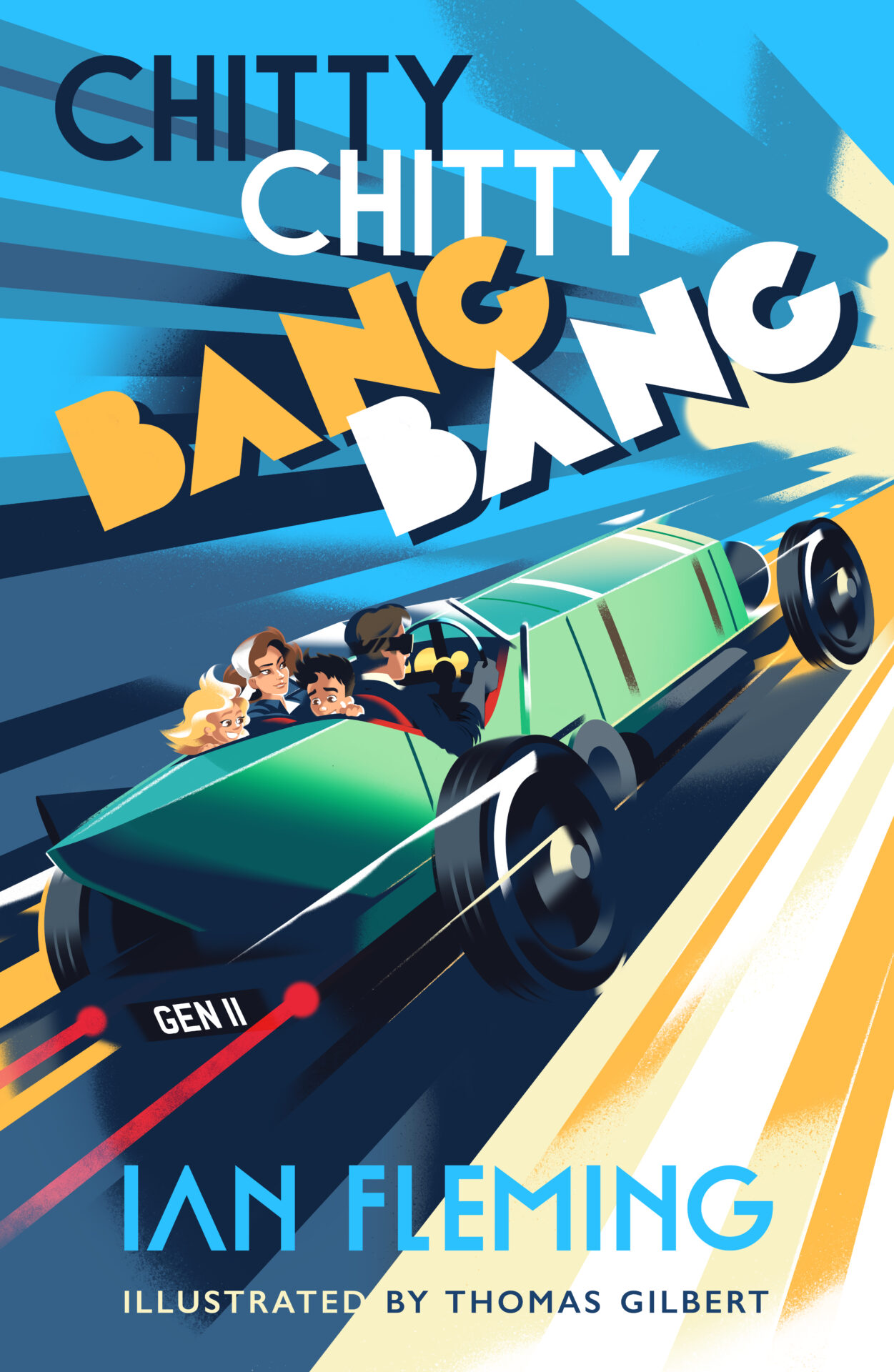Why Bond fans – of all ages – should read Chitty Chitty Bang Bang
By David Lowbridge-Ellis MBE
As with Bond, most people’s first encounter with that other great Fleming creation, Chitty Chitty Bang Bang, is through the film version. It’s an admirable adaptation and it still works, nearly sixty years down the road from its first release. I recently rewatched it with my niece (age seven, going on 17) and nephew (aged four, obsessed with anything that goes on four wheels) and they enjoyed it immensely, as did I.
But I’ve spoken with so many avowed fans of Fleming – people who have read all fourteen Bond books cover to cover ad infinitum – who have never even picked up a copy of Chitty Chitty Bang Bang, let alone read one.
Why?
The obvious answer is that Chitty doesn’t feature the character of James Bond. But there are several Fleming ‘James Bond’ stories where 007 barely features. See for instance, Quantum of Solace and Octopussy, widely acclaimed as two of his best (and two of my personal favourites). Even more so than Bond himself, many of us are attracted to Bond’s world. As anyone who has read Chitty Chitty Bang Bang already knows, all of Fleming’s works take place in the same milieu.
Perhaps Bond fans resist reading Chitty because it’s pigeonholed as a children’s book. But this argument holds less water than it once did. There’s a growing recognition that reading books intended for children doesn’t merely reconnect us to our childhoods in a nostalgic way. Rather than infantalising us, reading the odd children’s book every once in a while is good for us, reminding us of what we once thought we might be capable of, before our imaginations were stifled by adulthood, thereby motivating us to make more ambitious life choices.
WH Auden – incidentally a big Fleming Bond fan – summed it up best: “There are good books which are only for adults, because their comprehension presupposes adult experiences, but there are no good books which are only for children.”
As someone who read their first Fleming Bond book aged eight, I can attest to some of the ‘adult experiences’ in Thunderball being beyond my comprehension! Had I instead taken Chitty Chitty Bang Bang into school as my reading book I would no doubt have provoked less eyebrow-raising from my teacher.
But the worlds of Chitty and Bond are not as different as they first appear. While we’re currently going through a golden age of multiverses in popular media, Chitty and Bond are recognisably part of the same universe, even a shared universe.
There are treasures aplenty in Chitty for hunters of Bond Easter Eggs. I won’t spoil it for those about to embark on their first reading, but much of the action of the first section takes place in territory familiar to fans of Fleming’s Moonraker. And later in the story, the Pott family check into a hotel that anyone who has read Casino Royale will recognise immediately.
The Pott family’s patriarch, Commander Caractacus Pott, not only shares Bond’s Royal Navy rank but also his predilection for bacon and eggs. He’s more of a free-spirit than Bond, living a precariously-impecunious existence. But although Pott didn’t follow Bond’s career path into salaried civil servitude, you could easily imagine them having served together in the Second World War.
Commander Pott is the character who Fleming has vocalise his own personal credo (which Fleming himself inherited from his mother):
“Never say no to adventures. Always say ‘yes’, otherwise you’ll lead a very dull life.”
While Fleming never has Bond himself say this, the principle underpins the whole of the Bond series. We all know how quickly his 007 goes off the rails whenever boredom appears on the horizon. His you only live once (or possibly twice) attitude to life is something many Bond fans seek to emulate. If anything, Chitty Chitty Bang Bang is an even purer distillation of Fleming’s carpe diem philosophy. Midway through the story, after the Pott family realise they are in very real danger, the response of their patriarch is to cheerfully announce: “You never get real adventures without a bit of risk somewhere.”
Like all of the best books primarily intended for children, Chitty Chitty Bang Bang doesn’t skimp on putting its heroes at risk. By turns they face many of the threats Bond faces down throughout his adventures, being almost drowned, electrocuted, shot and blown to smithereens. An encounter with a human skeleton is genuinely creepy for readers of all ages. One of my favourite passages is the Pott family sailing Chitty – in her hovercraft form, years before 007 rode an inflatable gondola through Venice in the film of Moonraker – through spooky shipwrecks. Here, and throughout the novel, Fleming’s imagery is as uncanny as it ever is in the Bond series.
The villains are more grounded than those of the film adaptation, but no less colourful. As with his Bond books, Fleming revels in using underworld argot, deploying it with brio. The difference with Chitty is he stops to explain what the slang terms mean to younger – or less criminally-conversant – readers. Who knew there were so many terms for high explosives? If this all sounds a bit patronising, don’t fear; when I re-read Chitty recently, I found all of the direct addresses to the reader gave the whole book a surprisingly (post)modern feel, certainly compared with other children’s books from the 1960s.
Even when writing for adults, Fleming was never afraid to slip into the declarative mood, explaining things to us – food, drink, vehicles, weapons, architecture – like a patient and ever-so-knowledgeable teacher. As escapist as the Bond books are, they are also great infotainment. A standout example in Chitty is Fleming’s veritable essay on how a French breakfast differs from an English one, which even present day readers who are well aware of the meaning of cafe au lait will find satiating.
Fleming knows exactly what he is doing. His omniscient narration is so playful, you can’t help but get drawn in. Rather than explain everything about the villain’s plan in tedious detail, he tells us this is “more or less” what they’re up to, cobbled together from overheard conversations by young heroes Jeremy and Jemima, who are both given more agency as the story progresses. This is childhood as we choose to remember it: with the boring bits cut out.
As adult readers, we take delight in Fleming’s playful asides (was there ever a book with more parentheses?). It’s also a joy to read Fleming doing what he rarely dares to do in the Bond series: undercutting the seriousness. You can see this as soon as the opening sentence. As ever with Fleming, the book’s opener is a punchy and perfectly formed conglomeration of clauses – but here there is a wry and very relatable toffee-related twist in the tail.
The spectre of confectionery looms large across the whole story. In the world of Bond, sweet things are associated with childhood memories (most notably in the opening to On Her Majesty’s Secret Service). In Chitty, sweets are the story, culminating in an “easy to make and absolutely delicious” fudge recipe (folded more organically into the story than Ian’s recipe for scrambled eggs in 007 in New York, the raison d’etre of that particular short story/apology to the denizens of NYC).
As ever with Fleming, the women are a force to be reckoned with. This is as far from a ‘boy’s own’ story as you can imagine. Young Jemima has just as much – if not more – agency than her twin brother Jeremy. She’s certainly more of a strategist than her male counterpart, preferring to think her way out of problems. Jeremy is more content to follow his first impulse and suggest blowing things up. There are definitely shades of the male/female dynamics at play at the end of Fleming’s Moonraker, with Jemima emerging as a younger version of Gala Brand.
But the ‘Bond Girl’ of the piece is, of course, Chitty herself. Early on, we have Commander Pott picking apart why we use female pronouns for “all bits of machinery that people love”. And Chitty – anthropomorphised throughout – is more than capable of giving this love back in return. After escaping not-quite-unscathed from an adventure, she is “quite happy being attended by a host of admiring French mechanics”. Oooh la la!
In a 1956 letter to Raymond Chandler, Fleming described his own books as “pillow fantasies of the bang-bang, kiss-kiss variety”. There is nothing approaching kiss-kiss action in Chitty, but we do get a lot of bang bang.
While Chitty was generally well-reviewed on its original release in 1964, John Rowe Townsend in The Guardian was one of the dissenters. He sniffily observed that “we have the adult writer at play rather than the children’s writer at work.”
Needless to say, generations of children have disagreed with him.
And to my adult ears, although Townsend didn’t intend his comment to be taken as ringing endorsement, this is what it sounds like to me! As an adult reader well-versed in Fleming’s other work, it’s a joy to read Fleming in more playful mode, especially considering the circumstances that attended the writing. When Fleming wrote Chitty Chitty Bang Bang, he was recovering from a heart attack, unable to have any adventures beyond those in his own head. Chitty had been going around in his brain for years; it started life as the bedtime story he told his son Caspar. Even though Fleming was far from firing on all cylinders physically, his imagination was driving away with him. Forbidden by doctors to use a typewriter, he wrote the whole of Chitty in pencil. Writing provided him with some sorely needed escapism.
Anyone thinking they shouldn’t bother reading the book of Chitty Chitty Bang Bang because they’ve already seen the film would do well to remember how different experiences the Bond books are from the Bond films. The film of Chitty was produced by Albert R. Broccoli, co-written by You Only Live Twice screenwriter Roald Dahl and features several Bond film alumni in the cast. While technically not an Eon production (Harry Saltzman did not co-produce) it’s almost as Eon-ised a version of Fleming’s world as the one depicted in the Eon Bond films.
Both the book and film of Chitty are adventures well worth saying yes to.
Fleming himself appeared to be uncertain about whether he had succeeded in writing Chitty for children, telling his publisher “Heaven knows what your children’s book readers will think of them”. Self-deprecating as ever about his literary talent, he nevertheless rallied sufficient courage to nail his colours to the mast, adding “they are in fact designed for a readership of around seven to ten”.
Whatever one’s age, Fleming’s original text is well worth reading in its own right, especially if you’re a Bond fan.
David Lowbridge-Ellis MBE is the award-winning creator of the acclaimed Licence to Queer website, podcast and YouTube channel. A lifelong Bond fan and a teacher by vocation, in 2023 he was awarded MBE in King Charles’s first Birthday Honours for his not-so-secret Services to Education. You can find him on Instagram, X and Facebook.
A new paperback edition of Chitty Chitty Bang Bang, featuring the original text and brand new illustrations throughout from car designer Thomas Gilbert, is published tomorrow.


